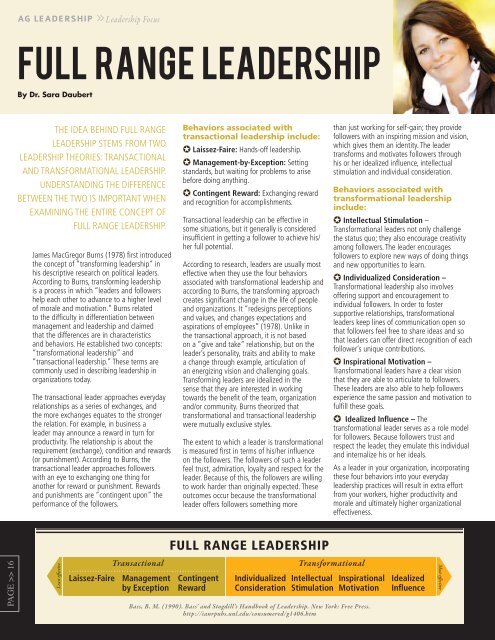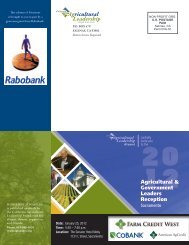hori zons
Champions of Ag Leadership - California Agricultural Leadership ...
Champions of Ag Leadership - California Agricultural Leadership ...
- No tags were found...
Create successful ePaper yourself
Turn your PDF publications into a flip-book with our unique Google optimized e-Paper software.
AG LEADERSHIP >> Leadership Focus<br />
Full range leadership<br />
By Dr. Sara Daubert<br />
THE IDEA BEHIND FULL RANGE<br />
LEADERSHIP STEMS FROM TWO<br />
LEADERSHIP THEORIES: TRANSACTIONAL<br />
AND TRANSFORMATIONAL LEADERSHIP.<br />
UNDERSTANDING THE DIFFERENCE<br />
BETWEEN THE TWO IS IMPORTANT WHEN<br />
EXAMINING THE ENTIRE CONCEPT OF<br />
FULL RANGE LEADERSHIP.<br />
James MacGregor Burns (1978) first introduced<br />
the concept of “transforming leadership” in<br />
his descriptive research on political leaders.<br />
According to Burns, transforming leadership<br />
is a process in which “leaders and followers<br />
help each other to advance to a higher level<br />
of morale and motivation.” Burns related<br />
to the difficulty in differentiation between<br />
management and leadership and claimed<br />
that the differences are in characteristics<br />
and behaviors. He established two concepts:<br />
“transformational leadership” and<br />
“transactional leadership.” These terms are<br />
commonly used in describing leadership in<br />
organizations today.<br />
The transactional leader approaches everyday<br />
relationships as a series of exchanges, and<br />
the more exchanges equates to the stronger<br />
the relation. For example, in business a<br />
leader may announce a reward in turn for<br />
productivity. The relationship is about the<br />
requirement (exchange), condition and rewards<br />
(or punishment). According to Burns, the<br />
transactional leader approaches followers<br />
with an eye to exchanging one thing for<br />
another for reward or punishment. Rewards<br />
and punishments are “contingent upon” the<br />
performance of the followers.<br />
Behaviors associated with<br />
transactional leadership include:<br />
Laissez-Faire: Hands-off leadership.<br />
Management-by-Exception: Setting<br />
standards, but waiting for problems to arise<br />
before doing anything.<br />
Contingent Reward: Exchanging reward<br />
and recognition for accomplishments.<br />
Transactional leadership can be effective in<br />
some situations, but it generally is considered<br />
insufficient in getting a follower to achieve his/<br />
her full potential.<br />
According to research, leaders are usually most<br />
effective when they use the four behaviors<br />
associated with transformational leadership and<br />
according to Burns, the transforming approach<br />
creates significant change in the life of people<br />
and organizations. It “redesigns perceptions<br />
and values, and changes expectations and<br />
aspirations of employees” (1978). Unlike in<br />
the transactional approach, it is not based<br />
on a “give and take” relationship, but on the<br />
leader’s personality, traits and ability to make<br />
a change through example, articulation of<br />
an energizing vision and challenging goals.<br />
Transforming leaders are idealized in the<br />
sense that they are interested in working<br />
towards the benefit of the team, organization<br />
and/or community. Burns theorized that<br />
transformational and transactional leadership<br />
were mutually exclusive styles.<br />
The extent to which a leader is transformational<br />
is measured first in terms of his/her influence<br />
on the followers. The followers of such a leader<br />
feel trust, admiration, loyalty and respect for the<br />
leader. Because of this, the followers are willing<br />
to work harder than originally expected. These<br />
outcomes occur because the transformational<br />
leader offers followers something more<br />
than just working for self-gain; they provide<br />
followers with an inspiring mission and vision,<br />
which gives them an identity. The leader<br />
transforms and motivates followers through<br />
his or her idealized influence, intellectual<br />
stimulation and individual consideration.<br />
Behaviors associated with<br />
transformational leadership<br />
include:<br />
Intellectual Stimulation –<br />
Transformational leaders not only challenge<br />
the status quo; they also encourage creativity<br />
among followers. The leader encourages<br />
followers to explore new ways of doing things<br />
and new opportunities to learn.<br />
Individualized Consideration –<br />
Transformational leadership also involves<br />
offering support and encouragement to<br />
individual followers. In order to foster<br />
supportive relationships, transformational<br />
leaders keep lines of communication open so<br />
that followers feel free to share ideas and so<br />
that leaders can offer direct recognition of each<br />
follower’s unique contributions.<br />
Inspirational Motivation –<br />
Transformational leaders have a clear vision<br />
that they are able to articulate to followers.<br />
These leaders are also able to help followers<br />
experience the same passion and motivation to<br />
fulfill these goals.<br />
Idealized Influence – The<br />
transformational leader serves as a role model<br />
for followers. Because followers trust and<br />
respect the leader, they emulate this individual<br />
and internalize his or her ideals.<br />
As a leader in your organization, incorporating<br />
these four behaviors into your everyday<br />
leadership practices will result in extra effort<br />
from your workers, higher productivity and<br />
morale and ultimately higher organizational<br />
effectiveness.<br />
PAGE >> 16<br />
Laissez-Faire<br />
Transactional<br />
Management<br />
by Exception<br />
FULL RANGE LEADERSHIP<br />
Contingent<br />
Reward<br />
Individualized<br />
Consideration<br />
Transformational<br />
Intellectual<br />
Stimulation<br />
Inspirational<br />
Motivation<br />
Bass, B. M. (1990). Bass’ and Stogdill’s Handbook of Leadership. New York: Free Press.<br />
http://ianrpubs.unl.edu/consumered/g1406.htm<br />
Idealized<br />
Influence




